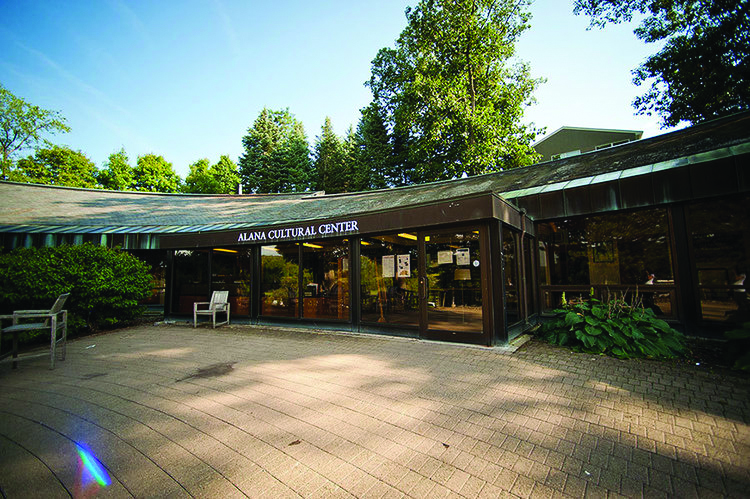Students Share Social Justice Experiences at Leadership Panel
On Wednesday, Jan. 26th, the Africana, Latin, Asian and Native American (ALANA) Cultural Center hosted a dialogue about social justice experiences among multicultural student leaders. The panel discussion, moderated by sophomore Elannah De La O, was one of several events constituting Colgate’s Martin Luther King Jr. (MLK) Week celebration, an annual recognition of King’s legacy. The panel began with introductions from panelists and brief descriptions of their leadership roles on campus.
“Do you have any strategies you would like to share with us in being politically savvy as a student leader on campus?” De La O asked.
Senior Sophia Beresford emphasized the importance of finding consistency with colleagues and harboring authentic passion about social justice work.
“I think oftentimes [students] start things and it slowly disappears … and if there’s no immediate threat or immediate event that happens, it’s hard to keep going, especially when that’s not our job,” Beresford said. “That’s just something we do because some of us belong to identities that compel us to do that work naturally. … I would love to see the [Colgate Student Coalition] continue with the younger students. … Just continuing to come together from different pockets of campus.”
Senior Keilani Blas echoed Beresford in advocating for finding a team with shared objectives, but also defining the line between personal and work relationships. Blas discussed how collaborating with peers on activist projects can muddy the line between friendly and professional work, and she spoke to the importance of not abusing friendships to help with activist work.
“What’s in it for [all students] to do some kind of social justice activism on campus?” De La O asked next.
Panelists spoke to different ways that students can engage with social justice work on campus. Blas discussed the responsibility students have to make themselves aware of what organizers are doing on campus, whether via Instagram or word of mouth, rather than relying on organizers to share their work with the student body. Senior Adrianna Carsinati echoed Blas’s argument in reminding the community that it is not the job of students of color to educate white students about social justice work and discouraged burdening people of color with the responsibility of keeping students informed. In response, senior John Morgan emphasized the importance of self care in avoiding burnout.
Morgan holds various leadership roles on campus and advocates for diversity, equity and inclusion in his extracurricular spaces.
“With the Debate Society, I co-wrote our equity policy, creating clear guidelines for club conduct and issues surrounding [Diversity, Equity and Inclusion] (DEI),” he said. “It furthers the club’s emphasis on inclusivity and accessibility. With Link Staff, we truly tried to revamp our training on DEI, and we were very intentional during the application process while I was a lead link. I really wanted to make sure students of color felt like they would have a place on our staff, and that they felt supported throughout orientation as well. When I graduate, I trust that people will continue the work that I’ve started, and in conjunction with the DEI initiatives being practiced by the admission office, I’m confident the long-term benefits are inevitable,” he said.
De La O continued the dialogue with a question about collaboration among cultural groups and other organizations. “How would you encourage other groups with more money and alumni attention to get better involved with social justice movements, and how can they help cultural groups?” she asked.
Morgan argued that increasing diversity leadership positions particularly is critical to social justice engagement and explained that different backgrounds give different perspectives. Beresford expressed enthusiasm about working with other campus groups, but noted that collaborations between the Black Student Union (BSU) and non-ALANA groups often result from BSU’s outreach rather than that of other organizations.
“It would be nice to have more mainstream groups reach out,” she said. “It would give [ALANA organizations] more of a spotlight that they deserve.”
“Why do you think that being a student organization leader on campus is an effective way to promote social justice?” De La O asked at the end of the panel.
Junior Owusu Ansah spoke to the effectiveness of peer to peer education. In comparison with professor to student education, Ansah suggested that peer to peer education is a much easier form of communication and consequently could lead to more effective promotion of social justice among students.
Esther Rosbrook, the director of the ALANA Cultural Center, works with student leaders of multicultural organizations and spoke to students’ commitment to their leadership.
“College experiences are not always easy for many students, so it is gratifying to witness students feel empowered to come forward with their ideas, share their dreams and finally see them as part of Colgate’s meaningful college experiences,” she said. “Based on my observation, they cannot empower and grow with others until they reach this point. … [Student leaders] feel obligated to fight for their community, identity and the lived principles they believe in. So when I witness their commitment to developing their leadership, organizational and social skills, I admire them even more.”








